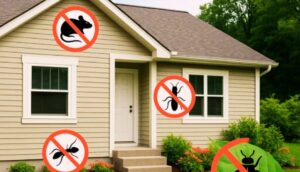How To Treat Scale Insect Pest

Scales are tiny insects that are common pests to both outdoor and indoor plants, there are generally two types of scales, soft scales and armored scales. Scales can be found in great masses in a fixed or unmovable position on garden plants. These insects are sucking insects and extract the sap from the plant.
Scales can also be found on nursery-grown plants, these insects are widespread, and their excrement or waste is sugary attracting ants that use the scale’s by-product as a food source. It’s been discovered that ants will maneuver another sucking insect (aphid) through garden areas so they can feed on the plant’s sap and in turn ants will use the excrement of aphids for food because of the aphid’s feces that is sugary so if there is a heavy population of ants on your garden plants may be a clear indication of a sucking insect including scales.
The excrement of scales can also cause garden plants to be covered with a black substance known as sooty mold that grows on plants. Sooty mold causes the plant to look sickly.
Also, sooty mold can interfere with the way plants manufacture their food in the process we know as photosynthesis, the adults remain stationary while the nymphs move about actively over the plant surface feeding and causing damage to plant life.
As an Amazon Associate I earn from qualifying purchases
Signs of Scale infestation
If your outdoor or indoor plants are showing these symptoms may be a sign that you have a scale insect pests issue.
- Physically seeing tiny insects that are from 1/16 to 3/8 in size, they resemble bumps on plants, scale insects grow beneath a wax covering that resembles fish scale. They remain in a fixed position or state on garden plants feeding.
- Plants have a sticky substance that is known as honeydew, this is the excrement of scales from sucking the plant’s sap.
- Under heavy infestation, outdoor plants develop a black or dusty coating known as sooty mold, sooty mold develops from the sugary substance or excrement of scales.
- Plants develop yellow-mottled leaves.
- Plant leaves turn brown followed by leaf drop.
- Because of leaf drop the canopy begins to thin.
- There is the presence of branch dieback.
How to Control Scale Insects Outdoors
There are several ways to control scales in an outdoor garden setting.
- If garden or container plants are small to medium size and if the infestation is not that many then simply wiping the scales off with a damp cloth will bring control. You may have to apply a little pressure to remove the scales completely. Remember not to apply too much pressure because you don’t want to damage or break immature branches, stems, or leaves.
- For indoor plants, a cloth dipped in soapy water rung out and then proceed to remove insects.
- Insecticides such as horticultural oil, neem oil, or insecticidal soap can be used, before using insecticides read and follow the manufacturer’s directions for the best results.
- Heavily infested branches can be removed with a hand pruner.
- Encourage natural predators into your garden to control scales, some of these insects are ladybugs, parasitic wasps, soldier beetles, lacewings, etc…
How to Control Scale Insect Indoors
There are several ways to control scales on indoor plants.
- A clean cloth soaked in water and soap, ring the towel out then proceed to wipe scales from plants.
- Insecticides that can be used for scale control are neem oil, horticultural oil, or insecticidal soap treatment. Before insecticide applications read and follow the manufacturer’s directions for the best results.
- If the infestation is large then prune the infected part and dispose of it immediately.
How to Discourage Scale Insects from Your Garden
Even in the best-kept garden issues still may arise but the good news is there are a few things we can do to at least minimize the presence of scales and other garden pests. Keeping your garden plants healthy will give them a fighting chance against insect pests.
- Install your plant in the right location, and provide the amount of lighting that is required.
- Give your plants the right amount of water, no more no less.
- Ensure that plants are installed in the right soil type.
- Treat all infested plants right away so that the infestation doesn’t spread to healthy plants.
- Before bringing new plants home do a thorough inspection to ensure that plants are not only disease-free but there are no insects including scales hitchhiking.
- Keep an eye out for scales and other insect pests by doing a regular inspection of your plants.
- Plants that show disease symptoms should be treated right away or disposed of if the disease is too server to revive plants.
10 Frequently Asked Questions (FAQs)
1. What are scale insects, and why are they a problem?
Scale insects are tiny pests that suck the sap from your plants. They often look like small bumps or crusty spots on stems and leaves. Left untreated, they can weaken plants, cause yellowing, leaf drop, or even kill the plant. They’re sneaky too — many people mistake them for part of the plant!
2. How can I tell if my plant has a scale insect problem?
Take a good look at your plant’s stems, the undersides of the leaves, and where the leaves connect to the stem. If you notice small, dome-shaped bumps or a shiny, sticky substance (known as honeydew), chances are you’ve got scale insects hanging around. Another giveaway? If you spot ants crawling all over your plant — they’re big fans of the sweet honeydew these pests leave behind.
3. Are scale insects harmful to humans or pets?
Good news — scale insects don’t bite, sting, or carry diseases that harm humans or pets. However, the damage they cause to plants can lead to mold growth, which might trigger allergies if it spreads indoors. So it’s still best to get rid of them quickly.
4. What’s the best way to get rid of scale insects naturally?
For light infestations, start with manual removal. Use a soft brush or cloth to gently scrub them off, or blast them with a stream of water. Then, apply neem oil or insecticidal soap to suffocate any remaining pests. Reapply every 7–10 days until the problem is gone.
5. Can I use rubbing alcohol to kill scale insects?
Yes! Dabbing individual insects with a cotton swab dipped in 70% isopropyl alcohol is an effective spot treatment. It dries them out without harming most plants. Just test on a small area first to make sure your plant doesn’t react badly.
6. Do scale insects come back after treatment?
Unfortunately, yes — they can return if you don’t stay on top of it. Their protective shells make them tough to kill in one go. Regular monitoring and re-treating every couple of weeks during the growing season is the key to long-term control.
7. What plants are most vulnerable to scale insects?
Scale insects love a wide range of plants, but they especially go after citrus trees, ficus, orchids, hibiscus, and houseplants like pothos or rubber plants. If you grow these, check them often for signs of scale.
8. Are chemical insecticides effective against scale insects?
Some chemical insecticides can work, but timing is everything. They’re most effective against the crawler stage (when young scale bugs are mobile and before they develop a protective shell). For tough infestations, horticultural oil or systemic insecticides might be needed — but always follow the label and consider the environmental impact.
9. Can I prevent scale insects from coming back?
Yes! Keep your plants healthy with proper watering, pruning, and spacing for airflow. Avoid over-fertilizing — new, tender growth attracts pests. You can also spray neem oil or insecticidal soap monthly as a preventive treatment, especially if you’ve had issues before.
10. Will ladybugs or other beneficial insects help with scale control?
Absolutely! Ladybugs, lacewings, and parasitic wasps love to munch on soft-bodied scale insects, especially in their crawler stage. If you have a garden, avoid harsh pesticides so these beneficial bugs can do their job naturally.
Other sucking garden insect pests
Conclusion
Scales are common garden pests that can cause injury both to indoor as well as outdoor plants, the good news is the scale population can be reduced where there is no longer a threat to plant life. This guide has covered the steps for scale insect pest control, these proven methods have worked over and over again, don’t allow scales to infect your garden plants or rob you of a good harvest.








